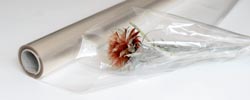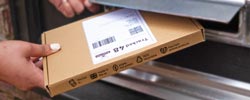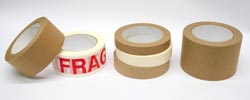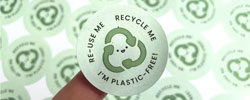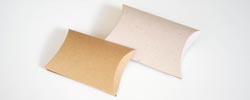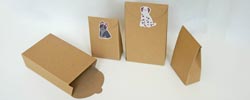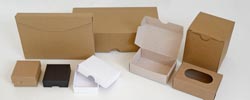Environmental Policy
Just as we ensure all our products are either renewable, recycled, recyclable, compostable and responsibly sourced, so naturally we make sure our production methods and packaging is as green and sustainable as is practical.
As a company we regularly review our environmental impact and happily embrace new technology (both high & low tec) to help improve our production, waste management, energy and water efficiency whenever we can. As such this also includes regular reviews of the environmental, ethical and social standards of our suppliers.
Personally we try to use green technology wherever possible, such as solar panels, rainwater harvesting and heat recovery systems. We of course recycle and reuse as much as we can.
We reuse packaging from our suppliers, we buy once used cartons and all our office paper is recycled. Please remember most of the packaging materials used by us in your orders is recyclable, so please try to reuse it or put it out for recycling so it can be made back into something useful.
In production we strive to get the best use of all raw materials and to keep any waste to a minimum. What waste we do produced is then either used for packaging orders or sent for recycling (collected by Whites Waste Paper Ltd - Registration No. CBDU 91885) and produces the raw material for yet more recycled paper.
As part of our green commitment we source all of our energy from 100% renewable and non-nuclear supplier Good Energy and have recently moved some of our deliveries over to carbon neutral supplier DPD.
To try and keep our carbon foot print to a minimum, we source all our material from UK or EU suppliers. We do not get any of our card, papers, envelopes, bags or packaging from outside the EU. This also ensures that our supply chain will always adhere to the latest UK & EU environmental and employment standards, and thus be treating people fairly while helping to look after the planet.
The vast majority of our products are produced from plastic free and renewable resources, sourced from the UK or EU to keep carbon miles as low as possible and wherever possible are made from recycled materials. Also, most of our products are either re-usable, recyclable, compostable or biodegradable.
Where it is necessary to use virgin or non-recycled materials, we will always endeavour to source the greenest options from UK and EU suppliers to ensure a reduced carbon footprint.
Why Recycle – The Benefits
Energy
-
Including total energy requirements involved in turning wood chips into pulp, the manufacture of virgin paper from tree pulp consumes up to 50% more energy than is used in the making of recycled paper.
Greenhouse emissions
-
The production of recycled paper also reduces carbon emissions. In addition, carbon is retained in the paper when recycled rather than being released when incinerated or broken down in landfill sites.
When compared to the production of virgin paper, 1 tonne of recycled paper can save 1.32 tonnes of CO2 equivalent.
Recycling can help reduce greenhouse gas emissions over the whole life of the product. If paper and card are sent to landfill it rots and in the process emits methane, a powerful greenhouse gas, or if incinerated releases carbon dioxide, again recognised as contributing to climate change.However, paper is a readily recyclable product, and through recycling, the carbon is retained in the product for longer and contributes to reducing the need for virgin fibre. This allows forests to be managed over longer periods and contributes very significantly to the sustainability of the overall paper industry.
Bleaching
-
Pulping, bleaching and manufacturing paper, especially paper made from 'chemical' pulp (used for most printing papers other than newsprint), requires more chemicals and is often more polluting than making recycled paper.
Recycled paper production uses up to 50% less water than virgin paper and fewer chemical processes.
Most recycled papers require little if any bleaching and where bleaching is used, almost invariably chlorine-free agents are used.
Wildlife
-
By choosing recycled paper you are reducing the pressure on old-growth forests which support a huge range of plant and animal species. Plus there is a limit to how much natural or original forest we want to see turned over to 'farmed' forest.
Waste
-
Recycling is about far more than saving trees. It is about the waste of natural resources. We believe that avoidable waste is ecological vandalism. By choosing to buy recycled paper you are actively helping to reduce such waste.
Paper - how it's recycled
Almost any used paper can be recycled, including newspapers, cardboard, packaging, stationery, 'direct mail', magazines, catalogues, greeting cards and wrapping paper.
It is important that papers are kept separate from other household waste, as papers contaminated with food waste or broken glass, for example, cannot easily be recycled.
However paper also cannot be recycled indefinitely - Every time a fibre is recycled it loses some of its strength and the fibre length decreases. After being re-used about six times the fibres become too short for paper making.
The fibres that can no longer be used are separated by the mill and then either used for energy generation, soil conditioner or sent to landfill.
Once waste paper has been collected either by your local council or by a commercial recycling company it is graded into different qualities. After which it is pulped, cleaned and de-inked by:
Dispersal – the ink is diluted and dispersed in the pulp (with no extra pollution).
De-inking – this is more a mechanical than a chemical process. A detergent (usually phosphate free) is used to dissolve the ink. Most commonly air bubbles are injected into a large vat (de-inking cell) holding the pulp.
Ink sticks to the bubbles and rises to the surface where it is scooped off. This process is repeated a couple of times.
The de-inked waste is solidified and either burned, turned into soil conditioner or safely disposed off.
The now cleaned fibre is then pumped onto a paper machine to be made into recycled paper.
So there really is no need to throw away recyclable waste paper as it not only contributes to landfill, greenhouse gases and global warming but also robs future generations of valuable and possibly irreplaceable resources.
The best recycling = good waste management + economic prudence.
Sustainability vs sustainable forestry
Paper made from virgin pulp is often labelled as ‘paper from sustainable forestry’. The term sustainable indicating that trees are replanted to replace those which are cut down.
Sustainability in ecological terms encompasses everything – cradle to grave, raw material to product, product to recycling, recycled material to new product.
This often results in the term 'Sustainable forestry' being misused as an 'eco-label'. It relates to the management of the forest where trees are grown as a raw material to make paper. refering to the re-planting of new trees to replace the crop that has just been felled. However this is normal practice. After all, no sustainable business would fail to look after the land that it's crop is planted upon, nor would it fail to replant another crop after harvesting. It would soon run out of raw material and be out of business.
This is a style of management we would expect as a minimum in the EU and as such should only be taken as an indicator that it has been grown to recognised standard. It only applies to virgin paper made from tree pulp. It has nothing to do with the use of waste paper used to make recycled paper!
That is not to say that using trees as a crop for paper is wrong. Far from it, when grown in a sustainable and ecologically responsible way, trees are a valuable source of raw material for paper making. Fresh paper will always be required to replenish waste paper which cannot be recycled. Paper production only becomes damaging environmentally when:
- Trees are grown as a 'cash crop' in mono-culture fashion (one species of tree) which supports little wildlife and can cause acidification of soil and water courses.
- Areas where clear-felling is practised, it can lead to soil erosion and damage local eco systems.
- They can need fertilisers, herbicides and insecticides, with other pesticides used to ensure a 'healthy' crop with consequent damage to the local environment.
Facts and Figures
- We use paper every day and as a nation 12.5 million tonnes are used each year.
- The paper industry is the UK's most successful recycler. Paper recycling is crucial in the UK due to the lack of forests (only 12% of the land base is forested).
- 67% of the paper and cardboard used in the UK is recovered for recycling.
- Recovered paper (used paper) is the most important raw material for the UK paper and board industry, representing over 70% of the fibre used to manufacture paper and board in the UK in 2013. This equates to nearly 8 million tonnes of paper and cardboard products.
- Every tonne of paper recycled saves 17 trees and 7,000 gallons of water.
- Based on the study*, WRAP considers that it is reasonable to say that recycling 1 tonne of paper and cardboard will avoid 1.4 tonnes of carbon dioxide equivalent compared to landfill, and 0.62 tonnes of carbon dioxide equivalent compared to incineration.
- 11 million tonnes of CO2 equivalent emissions were avoided by recycling paper and board in back in 2008, the equivalent of taking around 3½ million cars off the road.
- It takes 7 days for a recycled newspaper to come back as a newspaper again.
- All of the newsprint used in the UK contains around 78% of recycled paper.
- UK tissue mills use around half million tonnes per year of high grade recycled paper.
- Corrugated packaging material consists nearly of 100% recycled material.
Sources and Further Information:
Waste and Resources Action Programme (WRAP)
Local Authority Recycling Advisory Committee (LARAC)
Centre for Alternative Technology
















